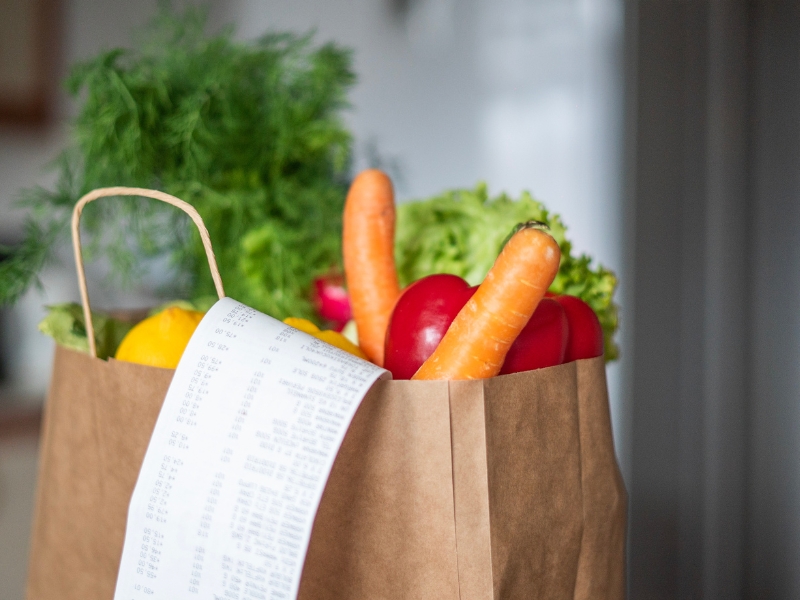59 Smart Ways to Reduce Your Supermarket Spend

This post may contain affiliate links. At no cost to you, we earn a commission from qualifying purchases.
People are so skint these days, saving money on groceries is more important than ever. For many families, the supermarket is one of the largest areas of spend. However, with a few smart strategies, it’s possible to cut down this cost significantly without compromising on quality or nutrition.
Plan Your Meals
The cornerstone of smart supermarket spending is effective meal planning. Begin each week by setting aside some time to plan your meals. This not only promotes a balanced diet but is crucial in reducing food waste and unnecessary spending.
- Start with a Calendar: Outline your meals for each day, taking into account your schedule. Quick meals may be better on busy days, while you might have more time to cook at weekends.
- Include All Meals and Snacks: Don’t just plan for dinners. Think about breakfast, lunch, and snacks too. This comprehensive approach prevents last-minute takeaways or convenience store runs.
- Check What You Already Have: Before making a shopping list, check your pantry, fridge, and freezer. Use up what you already have to minimise waste and avoid buying duplicates.
- Batch Cooking and Leftovers: Consider recipes that are suitable for batch cooking. Meals that can be prepared in large quantities and stored for later are great for saving both time and money.
- Diverse Cuisine to Keep It Interesting: Introduce a variety of cuisines into your meal plan. This not only keeps your diet interesting but can also be a way to utilise seasonal and on-sale ingredients creatively.
- Shopping List is Key: Once your meal plan is set, make a detailed shopping list. Organise your list by supermarket sections (e.g., produce, dairy, bakery) for efficiency.
- Stick to the List: When you’re at the supermarket, stick to your list. Avoiding impulse buys is easier when you have a clear plan and a list that supports it.
- Flexibility: While sticking to a plan is important, a bit of flexibility can help in making the most of discounts and deals. If you find a staple ingredient on sale, consider adjusting your meal plan to incorporate it.
Embrace Seasonal Produce
Incorporating seasonal fruits and vegetables into your diet is not only a culinary delight but also a smart financial move. Here’s how and why you should embrace seasonal produce:
- Cost-Effective: Seasonal produce is generally more affordable. When fruits and vegetables are in abundance, the prices go down, making it a budget-friendly choice.
- Enhanced Flavour and Nutrition: Seasonal produce is picked at the peak of its freshness, meaning it’s not only tastier but also packed with more nutrients.
- Support Local Farmers: Buying seasonal often means you’re purchasing produce that’s grown locally. This not only supports local farmers and the economy but also reduces your carbon footprint due to shorter transportation distances.
- Discover New Recipes: Each season brings its own unique produce. This variety encourages you to experiment with new recipes and diversify your diet.
- Plan Your Shopping: Research what’s in season before you go shopping or look for signs in the supermarket indicating local and seasonal produce.
- Preserve Excess Produce: If you find a good deal on seasonal produce, consider preserving it through freezing, canning, or drying. This way, you can enjoy it throughout the year.
- Community Supported Agriculture (CSA) Schemes: Consider joining a CSA scheme where you receive a box of seasonal produce regularly. It’s a great way to ensure a steady supply of fresh, seasonal produce.
Compare Prices
Savvy shopping often involves comparing prices and brands to find the best deals. Here’s how you can do this effectively:
- Brand vs. Store Brands: Often, supermarket own brands offer similar quality to well-known brands but are significantly cheaper. Don’t overlook these options.
- Use Price Per Unit: Many supermarkets display the price per unit (like per kilogram or litre) alongside the total price. This makes it easier to compare different sizes and brands to find the best value.
- Take Advantage of Price Match Policies: Some supermarkets offer price match guarantees. If you find a product cheaper elsewhere, they may match the price.
- Use Technology: There are numerous price comparison apps and websites that can help you compare prices at different supermarkets. Utilize these tools to find the best deals.
- Keep an Eye on Sales and Offers: Regularly check for sales, special offers, and clearance items. These can offer significant savings.
- Be Flexible with Brands: Sometimes, switching brands can save you money without compromising on quality. Be open to trying different brands.
Use Loyalty Cards and Coupons
Leveraging loyalty programs and coupons is a fantastic way to save money. Here’s how you can make the most of these options:
- Sign Up for Loyalty Programs: Almost every major supermarket has a loyalty card program. Sign up for these to earn points on your purchases, which can be redeemed for discounts, vouchers, or even free products.
- Stay Informed About Offers: Regularly check the offers linked to your loyalty cards. Supermarkets often provide exclusive discounts to cardholders.
- Combine Deals with Coupons: Look out for coupons in newspapers, magazines, and online. Combining these coupons with existing deals can lead to significant savings.
- Digital Coupons: Many supermarkets now offer digital coupons that can be loaded directly onto your loyalty card from their website or app.
- Pay Attention to Points Promotions: Occasionally, supermarkets run promotions where you can earn extra points. Timing larger purchases for these periods can be more beneficial.
- Use Apps and Websites: There are several apps and websites dedicated to showcasing the latest deals and coupons. Utilise these resources to stay up-to-date.
Buy in Bulk
Purchasing items in bulk can be a significant money-saver, especially for non-perishable goods and everyday essentials. Here’s how to do it effectively:
- Identify What to Buy in Bulk: Focus on items that you use frequently and that have a long shelf life. This includes products like rice, pasta, canned goods, toilet paper, and laundry detergent.
- Compare Bulk Prices: Ensure that the bulk price is indeed cheaper than buying smaller quantities. Sometimes, larger packages are not always the most cost-effective.
- Storage Space: Consider your storage space before buying in bulk. You need enough space to store these items without cluttering your home.
- Share with Friends or Family: If buying in bulk is too much for your household, consider splitting the cost and quantity with friends or family members.
- Avoid Overbuying: While bulk buying is economical, purchasing more than you can realistically use can lead to waste, which is counterproductive.
- Membership Clubs and Wholesale Retailers: Explore membership clubs or wholesale retailers that specialise in bulk sales. They often offer substantial discounts on bulk purchases.
Avoid Shopping on an Empty Stomach
Shopping while hungry can significantly impact your purchasing decisions, leading to impulsive and often less healthy choices. Here’s why and how you should avoid it:
- Increased Impulse Buys: Hunger can weaken your self-control, making it more likely to buy items that are not on your list, especially snacks and comfort foods.
- Impact on Health Choices: When you’re hungry, your body craves quick energy, often leading you to choose high-calorie, less nutritious foods.
- Have a Snack or Meal First: Eating a meal or even a small snack before shopping can help in making rational choices. It ensures your decisions are based on your shopping list and not influenced by your current hunger.
- Stay Hydrated: Sometimes, thirst can be mistaken for hunger. Drinking water before shopping can also help in reducing impulsive snacking.
- Mindful Shopping: Being aware of your hunger levels and acknowledging how they might affect your shopping behaviour can help you stay focused on buying what you need.
Go for Reduced Items
Taking advantage of reduced-price items can lead to substantial savings. Here are some tips on how to effectively shop for these deals:
- Know the Best Times to Shop: Many supermarkets reduce prices at specific times of the day or week, particularly on items nearing their sell-by dates. Familiarise yourself with these times at your local store.
- Plan for Immediate Consumption or Freezing: Purchase reduced items that you can either use immediately or freeze for later use. This is particularly useful for bakery items, meat, and dairy products.
- Inspect the Quality: While reduced items are a bargain, ensure they are still of good quality and safe to consume.
- Balance with Your Needs: Only buy reduced items if they fit into your meal plan or are staples in your kitchen. Buying something simply because it’s cheap can lead to unnecessary spending and waste.
- Use for Meal Prep: Reduced items can be great for batch cooking and meal prepping. Cook and store meals for the week or longer.
Check Unit Prices
Understanding unit pricing is key to ensuring you’re getting the best value for your money. Here’s how to use this strategy effectively:
- Understand Unit Pricing: Unit prices show the cost per litre, kilogram, or another unit of measurement. This allows you to compare prices across different sizes and brands objectively.
- Look for Unit Price Labels: Many supermarkets display the unit price on shelf labels. Make it a habit to check these, not just the overall price.
- Use a Calculator: If unit prices aren’t displayed, use your phone’s calculator to work out the cost per unit. Divide the total price by the number of units in the package.
- Beware of Bulk Buying Traps: Larger packages are often cheaper per unit, but this isn’t always the case. Always verify by checking the unit price.
- Consider Your Consumption: Even if a larger size is cheaper per unit, it’s only a saving if you can use it before it expires or spoils.
Try Online Grocery Shopping
Online grocery shopping can be a game-changer in controlling your supermarket spend. Here are some advantages and tips:
- Avoid Impulse Purchases: Shopping online can help you stick to your list, as you’re less likely to be tempted by in-store displays and promotions.
- Easily Compare Prices: Most online grocery platforms allow for quick comparison of prices across different brands and sizes, helping you choose the most cost-effective options.
- Exclusive Online Deals: Many supermarkets offer online-only deals, including discounts and digital coupons, which can lead to additional savings.
- Track Your Spending: Online shopping carts allow you to see the total cost before checkout, enabling you to remove items if you’re over budget.
- Convenience and Time-Saving: Besides saving money, online shopping saves time, a valuable resource for busy families.
- Plan Delivery Times: Choose delivery slots that suit your schedule. Some supermarkets offer cheaper delivery charges for less popular times.
Reduce Waste
Minimising food waste is not only good for your wallet but also for the environment. Here’s how you can effectively reduce waste:
- Mindful Shopping: Purchase only what you need. Avoid bulk buying perishable items unless you’re sure you can use them.
- Proper Storage: Store food correctly to extend its shelf life. For example, keeping fruits and vegetables in the right conditions can prevent them from spoiling prematurely.
- Creative with Leftovers: Get creative with leftovers. Transform them into new meals or use them as ingredients in other dishes.
- Compost Organic Waste: Consider composting organic waste like fruit and vegetable peels. This reduces your rubbish and provides excellent fertilizer for gardens.
- Regularly Check Dates: Regularly check the dates on perishable items and plan meals around those nearing their expiration.
Reducing your supermarket spend doesn’t have to mean sacrificing quality. By being mindful, planning ahead, and making use of available deals and discounts, you can significantly lower your grocery bills. Remember, every little saving adds up over time, making a noticeable difference in your overall budget.
Featured image by 74images via Canva.com





